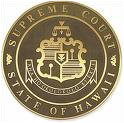To qualify for reimbursement from the Fund, a claim must meet the following conditions:
- The Claimant (the person filing the claim) must have engaged or hired the attorney in Hawaii;
- The attorney must have been licensed to practice law in Hawaii;
- The attorney must have had an office in Hawaii;
- The attorney must have been acting as the claimant’s attorney or in a fiduciary capacity on the claimant’s behalf;
- The claim must be filed within two years of the loss; and
- The attorney in question must have engaged in dishonest conduct.
In addition, the attorney involved must meet one of these requirements:
- The attorney is either deceased, bankrupt, or has been declared incompetent or incapacitated;
- The attorney has either been disbarred, suspended or has resigned from practicing law;
- The attorney has been convicted of a crime as a result of dishonest conduct;
- The attorney has left Hawaii or has disappeared; or
- The Claimant has obtained a judgment against the attorney due to dishonest conduct.
In some instances, Fund Trustees may require that the Claimant exhaust all other collection alternatives before filing a claim.
There are certain types of claims that are not covered by the Fund. These include:
- The losses of a spouse, children, parents, grandparents, siblings, partners, associates, employers and employees of, or business entities or trusts owned by or benefically owned by an attorney causing the losses.
- The losses that are otherwise covered by any bond, surety agreement, or insurance contract to the extent covered, including any loss to which any bondsman or surety or insurer is subrogated to the extent of that subrogated interest.
- The losses of any financial institution which are recoverable under a “Banker’s Blanket Bond” or similar insurance or surety contract.
- Losses in which the Claimant and attorney disagree on the quality of the legal services provided or the fee charged. A Fee Dispute does not necessarily constitute dishonest conduct.
Please note that claims of negligence or malpractice are not covered by the Fund. You might want to consult another attorney. And you can also discuss your situation with other agencies such as the Office of Disciplinary Counsel.
